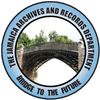While the Government Records Centre is temporarily closed, the Audio-Visual Unit located at 36-38 Red Hills Road and Jamaica Archives Unit located at 27 King Street, Spanish Town are still open.
| While the Government Records Centre is temporarily closed, the Audio-Visual Unit located at 36-38 Red Hills Road and Jamaica Archives Unit located at 27 King Street, Spanish Town are still open.
| While the Government Records Centre is temporarily closed, the Audio-Visual Unit located at 36-38 Red Hills Road and Jamaica Archives Unit located at 27 King Street, Spanish Town are still open.
| While the Government Records Centre is temporarily closed, the Audio-Visual Unit located at 36-38 Red Hills Road and Jamaica Archives Unit located at 27 King Street, Spanish Town are still open.
| While the Government Records Centre is temporarily closed, the Audio-Visual Unit located at 36-38 Red Hills Road and Jamaica Archives Unit located at 27 King Street, Spanish Town are still open.
| While the Government Records Centre is temporarily closed, the Audio-Visual Unit located at 36-38 Red Hills Road and Jamaica Archives Unit located at 27 King Street, Spanish Town are still open.
| While the Government Records Centre is temporarily closed, the Audio-Visual Unit located at 36-38 Red Hills Road and Jamaica Archives Unit located at 27 King Street, Spanish Town are still open.
| While the Government Records Centre is temporarily closed, the Audio-Visual Unit located at 36-38 Red Hills Road and Jamaica Archives Unit located at 27 King Street, Spanish Town are still open.
| While the Government Records Centre is temporarily closed, the Audio-Visual Unit located at 36-38 Red Hills Road and Jamaica Archives Unit located at 27 King Street, Spanish Town are still open.
| While the Government Records Centre is temporarily closed, the Audio-Visual Unit located at 36-38 Red Hills Road and Jamaica Archives Unit located at 27 King Street, Spanish Town are still open.
| While the Government Records Centre is temporarily closed, the Audio-Visual Unit located at 36-38 Red Hills Road and Jamaica Archives Unit located at 27 King Street, Spanish Town are still open.
